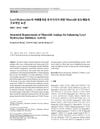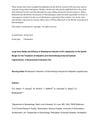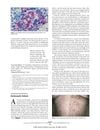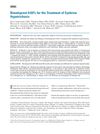Search
for
Sort by
Research
210-240 / 1000+ results
research Red Ginseng Monograph
Red ginseng may improve immunity, fatigue, memory, blood circulation, and menopausal symptoms, and is generally safe to consume.

research Treat Androgenetic Alopecia With Antiandrogens And Other Pharmacological And Non-Pharmacological Interventions
Use antiandrogens and other treatments for hair loss.

research A New Target for Squamous Cell Skin Cancer?
Prostaglandins and the enzyme AKR1C3 could play a role in skin cancer and hair loss, and further research is needed to understand these mechanisms.

research Structural and Dynamic Insights into Substrate Binding and Catalysis of Human Lipocalin Prostaglandin D Synthase
The research explains how a human enzyme binds and processes its substrate, which could relate to its role in biological functions and hair loss.

research Human Scalp Hair Follicles Express Prostaglandin E2 Lipid Mediator and Receptors for PGE2
Human scalp hair follicles have PGE2 and its receptors, which might affect hair growth.

research Therapeutic Options and Perspectives in the Treatment of Androgenetic Alopecia
The document concludes that more research is needed on treatments for hair loss in both men and women, especially on medication combinations and their benefits.

research Selective Inhibition by Minoxidil of Prostacyclin Production by Cells in Culture
Minoxidil stops cells from making prostacyclin, which may help with hair growth. More research is needed.

research Blood MUC-18/MCAM Expression in Patients with Melanoma: A Suitable Marker of Poor Outcome
High MUC-18/MCAM levels in blood indicate a worse outlook for melanoma patients.

research The Promoted Synthesis of Minoxidil by Magnetic Nanoparticles of Cobalt Ferrite (CoFe2O4) as a Heterogeneous Reusable Catalyst
Researchers made minoxidil efficiently using cobalt ferrite nanoparticles as a reusable catalyst.

research Hair Follicle Disruption Facilitates Pathogenesis to UVB-Induced Cutaneous Inflammation and Basal Cell Carcinoma Development in Ptch+/- Mice
Damaged hair follicles make mice more prone to skin inflammation and skin cancer after UV exposure.

research Structural Requirements of Minoxidil Analogs for Enhancing Lysyl Hydroxylase Inhibitory Activity
Minoxidil analogs can be improved for hair growth inhibition by modifying specific parts of their structure.

research Long-Term Safety and Efficacy of Bimatoprost Solution 0.03% Application to the Eyelid Margin for the Treatment of Idiopathic and Chemotherapy-Induced Eyelash Hypotrichosis: A Randomized Controlled Trial
Bimatoprost solution is effective and safe for long-term use in treating eyelash thinning.

research Morroniside Regulates Hair Growth and Cycle Transition via Activation of the Wnt/β-Catenin Signaling Pathway
Morroniside may help hair grow and stay in its growth phase by affecting certain cell signals.

research Regenerative Medicine and Hair Loss: How Hair Follicle Culture Has Advanced Our Understanding of Treatment Options for Androgenetic Alopecia
Hair follicle culture helps develop new treatments for hair loss.

research The Effect of Plasma Rich in Growth Factors Combined with Follicular Unit Extraction Surgery for the Treatment of Hair Loss: A Pilot Study
Combining plasma rich in growth factors with hair transplant surgery may lead to faster recovery and better outcomes for hair loss treatment.

research Postherpetic Poliosis
A man's chest hair turned white after a shingles infection, possibly due to virus-damaged pigment cells.

research Androgens and Hair: A Biological Paradox with Clinical Consequences
Androgens can both increase body hair and cause scalp hair loss.

research Corrective Hyaluronic Acid Fillers and Combination Cosmetic Treatments for Facial Cutaneous Defects Due to Autoimmune Connective Tissue Diseases: A Retrospective Review
Hyaluronic acid fillers and combination treatments significantly improve facial defects from autoimmune diseases and are well-tolerated.

research Engineered Exosomes and Composite Biomaterials for Tissue Regeneration
Exosomes show promise for future tissue regeneration.

research Diuretics
Diuretics can cause serious side effects and should be used carefully.

research The Role of Fractional Laser-Assisted Drug Delivery in Enhancing the Efficacy of Topical Bimatoprost Solution in the Treatment of Alopecia Areata: An Intra-Patient Comparative Randomized Clinical Trial
Using a laser with bimatoprost solution works better for hair regrowth in alopecia areata than bimatoprost alone.

research Proceedings of the Ninth World Congress for Hair Research 2015
The 2015 Hair Research Congress concluded that stem cells, maraviroc, and simvastatin could potentially treat Alopecia Areata, topical minoxidil, finasteride, and steroids could treat Frontal Fibrosing Alopecia, and PTGDR2 antagonists could also treat alopecia. They also found that low-level light therapy could help with hair loss, a robotic device could assist in hair extraction, and nutrition could aid hair growth. They suggested that Alopecia Areata is an inflammatory disorder, not a single disease, indicating a need for personalized treatments.
research Overview of Alopecia Areata
Alopecia areata is a genetic and immune-related hair loss condition that is often associated with other autoimmune diseases and does not typically cause permanent damage to hair follicles.

research A Systematic Simulation-Based Meta-Analytical Framework for Prediction of Physiological Biomarkers in Alopecia
The study identified 12 potential biomarkers for hair loss and how they affect hair growth.

research Polysaccharides from the Sargassum and Brown Algae Genus: Extraction, Purification, and Their Potential Therapeutic Applications
Sugars from Sargassum and brown algae may have health benefits like fighting viruses and helping with wound healing, but there are challenges in using them.

research Transdermal Delivery of a New Hair Growth Promoting Solution in Patients with Hair Loss
The hair growth solution reduced hair loss and increased hair thickness in a small group of patients.
research Phytotherapeutic Interventions Using Rodent Models of Hair Loss: Current Research and Future Strategy
Natural products show promise for new hair loss treatments.

research Latanoprost in the Treatment of Eyelash Alopecia in Alopecia Areata Universalis
Latanoprost can effectively treat eyelash hair loss, with 45% of patients showing hair regrowth and no reported side effects.

research Alopecia Areata: Current Understanding and Management
Alopecia areata is a chronic condition causing hair loss, with new treatments targeting the immune system showing promise.